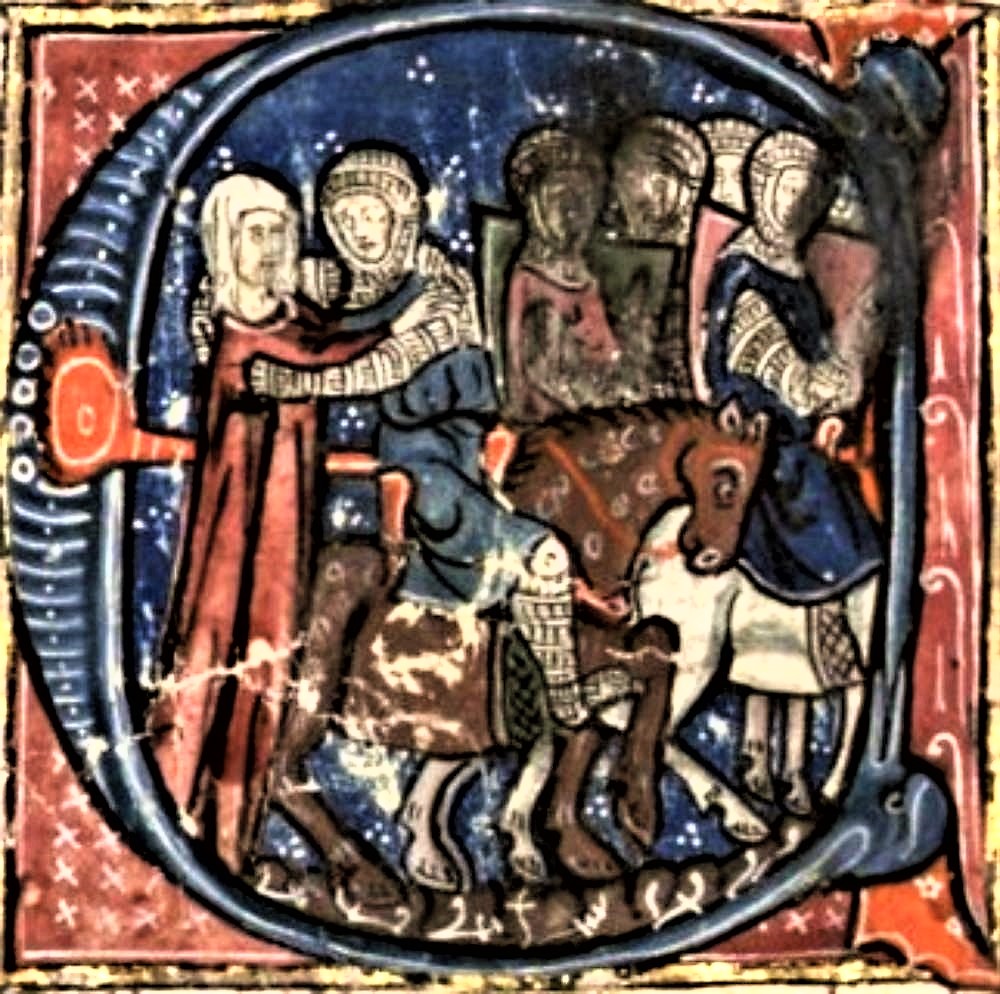|
Shams Al-Muluk Duqaq
Abu Nasr Shams al-Muluk Duqaq (died June 8, 1104) was the Seljuq ruler of Damascus from 1095 to 1104. Reign Duqaq was a son of the Seljuq ruler of Syria, Tutush I, and Khatun Safwat al-Mulk, He was the brother of Ridwan. When their father died in 1095, Ridwan claimed Syria for himself, and Duqaq initially inherited territory in the Jezirah and lived with his brother in Aleppo. However, he soon rebelled and seized control of Damascus, throwing Syria into near anarchy and civil war. Duqaq had the support of Yaghi-Siyan of Antioch, who had no quarrel with Ridwan but disliked his atabeg Janah ad-Dawla; joining Yaghi-Siyan and Duqaq was Ilghazi, governor of Jerusalem. Ridwan allied with Ilghazi's brother Sökmen of Artukids.El-Azhari, Taef. (2006). "Duqaq (d. 1104)". In ''The Crusades – An Encyclopedia''. pp. 367-368. Radwan attacked Yaghi-Siyan, and when Duqaq and Ilghazi came to assist him, Ridwan besieged Damascus as well. However, Ridwan soon quarrelled with Janah ad-D ... [...More Info...] [...Related Items...] OR: [Wikipedia] [Google] [Baidu] |
List Of Rulers Of Damascus
This is a list of rulers of Damascus from ancient times to the present. :''General context: History of Damascus''. Aram Damascus * Rezon I (c. 950 BC) *Tabrimmon * Ben-Hadad I (c. 885 BCE–c. 865 BC) *Hadadezer (c. 865 BC–c. 842 BC) * Hazael (c. 842 BC–c. 804 BC) * Ben-Hadad III (c. 796 BC) *Tab-El (c. 770 BC) *Rezon II (c. 740 BC–732 BC) Period of non-independence *to Assyria (732 BC–609 BC) **Ilu-Ittia (c. 8th century BC) *to Babylon (609 BC–539 BC) *to Persian Achaemenid Empire (539 BC–332 BC) *to Macedon (332 BC–323 BC) *to Antigonids (323 BC–301 BC) *to Ptolemaic Kingdom (301 BC–198 BC) *to Seleucids (198 BC–167 BC) *to Ituraea (167 BC–110 BC) (Semi independent from Seleucids) *to the Decapolis (110 BC–85 BC) (Semi independent from Seleucids) *to Nabataea (85 BC–64 BC) *to the Roman Republic/Roman Empire/Byzantine Empire (64 BC–635) **to the Ghassanids (529–584; ?–635) Rashidun period *Khalid ibn al-Walid (635–636) * Abu Ubaidah ibn ... [...More Info...] [...Related Items...] OR: [Wikipedia] [Google] [Baidu] |
Crusade
The Crusades were a series of religious wars initiated, supported, and sometimes directed by the Latin Church in the medieval period. The best known of these Crusades are those to the Holy Land in the period between 1095 and 1291 that were intended to recover Jerusalem and its surrounding area from Islamic rule. Beginning with the First Crusade, which resulted in the recovery of Jerusalem in 1099, dozens of Crusades were fought, providing a focal point of European history for centuries. In 1095, Pope Urban II proclaimed the First Crusade at the Council of Clermont. He encouraged military support for Byzantine emperor AlexiosI against the Seljuk Turks and called for an armed pilgrimage to Jerusalem. Across all social strata in western Europe, there was an enthusiastic response. The first Crusaders had a variety of motivations, including religious salvation, satisfying feudal obligations, opportunities for renown, and economic or political advantage. Later crusades were ... [...More Info...] [...Related Items...] OR: [Wikipedia] [Google] [Baidu] |
Tutush II
Abu Sa'id Taj al-Dawla Tutush (; died 25 February 1095) or Tutush I, was the Seljuk emir of Damascus from 1078 to 1092, and sultan of Damascus from 1092 to 1094. Years under Malik Shah Tutush was a brother of the Seljuk sultan Malik-Shah I. In 1077, Malik-Shah appointed him to take over the governorship of Syria. Later that year, Tutush reached Aleppo, then ruled by the Mirdasid emir Sabiq ibn Mahmud, and began a three-month-long siege of the city. In 1078/9, Malik-Shah sent him to Damascus to help Atsiz ibn Uvaq, an independent Turkish warlord who had taken the city in 1076, who was being besieged by the Fatimid forces. After the siege had ended, Tutush had Atsiz executed and installed himself in Damascus. He later expanded his realm by annexing Sidon, Gibelacar, Tiberias, Ramla, Jaffa and Jerusalem, which he granted to Artuk Bey, another Seljuk commander. He later returned to besieging Aleppo and called for reinforcements from Malik-Shah, yet his reinforcements were ambushed a ... [...More Info...] [...Related Items...] OR: [Wikipedia] [Google] [Baidu] |
Toghtekin
Toghtekin or Tughtekin (Modern tr, Tuğtekin; Arabicised epithet: ''Zahir ad-Din Tughtikin''; died February 12, 1128), also spelled Tughtegin, was a Turkic military leader, who was ''atabeg'' of Damascus from 1104 to 1128. He was the founder of the Burid dynasty of Damascus. Biography Toghtekin was a junior officer to Tutush I, Seljuq emir of Damascus and Syria. After the former's death in 1095, civil war erupted, and Toghtekin supported Tutush's son Duqaq as emir of the city against Ridwan, the emir of Aleppo. In the chaotic years which ensued Toghtekin was sent to reconquer the town of Jebleh, which had rebelled against the ''qadi'' of Tripoli, but he was unable to accomplish his task. On October 21, 1097, a Crusader army began the siege of Antioch. The local emir, Yaghi-Siyan, though nominally under Ridwan's suzerainty, appealed to Duqaq to send an armed force to their rescue. Duqaq sent Toghtekin, but on December 31, 1097, he was defeated by Bohemund of Taranto an ... [...More Info...] [...Related Items...] OR: [Wikipedia] [Google] [Baidu] |
Assassination
Assassination is the murder of a prominent or important person, such as a head of state, head of government, politician, world leader, member of a royal family or CEO. The murder of a celebrity, activist, or artist, though they may not have a direct role in matters of the state, may also sometimes be considered an assassination. An assassination may be prompted by political and military motives, or done for financial gain, to avenge a grievance, from a desire to acquire fame or notoriety, or because of a military, security, insurgent or secret police group's command to carry out the assassination. Acts of assassination have been performed since ancient times. A person who carries out an assassination is called an assassin or hitman. Etymology The word ''assassin'' may be derived from '' asasiyyin'' (Arabic: أَسَاسِيِّين, ʾasāsiyyīn) from أَسَاس (ʾasās, "foundation, basis") + ـِيّ (-iyy), meaning "people who are faithful to the fou ... [...More Info...] [...Related Items...] OR: [Wikipedia] [Google] [Baidu] |
Godfrey Of Bouillon
Godfrey of Bouillon (, , , ; 18 September 1060 – 18 July 1100) was a French nobleman and pre-eminent leader of the First Crusade. First ruler of the Kingdom of Jerusalem from 1099 to 1100, he avoided the title of king, preferring that of prince (''princeps'') and ''Advocatus Sancti Sepulchri'', or Advocate of the Holy Sepulchre. Second son of Eustace II, Count of Boulogne, Godfrey became Lord of Bouillon in 1076 and in 1087 Emperor Henry IV confirmed him as Duke of Lower Lorraine, a reward for his support during the Great Saxon Revolt. Along with his brothers Eustace III and Baldwin of Boulogne, Godfrey joined the First Crusade in 1096. He took part in actions at Nicaea, Dorylaeum and Antioch, before playing a key role during the capture of Jerusalem in 1099. When Raymond IV of Toulouse declined the offer to become ruler of the new kingdom, Godfrey accepted the role and secured his kingdom by defeating the Fatimids at Ascalon a month later, bringing the First Crusade to ... [...More Info...] [...Related Items...] OR: [Wikipedia] [Google] [Baidu] |
Beirut
Beirut, french: Beyrouth is the capital and largest city of Lebanon. , Greater Beirut has a population of 2.5 million, which makes it the third-largest city in the Levant region. The city is situated on a peninsula at the midpoint of Lebanon's Mediterranean coast. Beirut has been inhabited for more than 5,000 years, and was one of Phoenicia's most prominent city states, making it one of the oldest cities in the world (see Berytus). The first historical mention of Beirut is found in the Amarna letters from the New Kingdom of Egypt, which date to the 14th century BC. Beirut is Lebanon's seat of government and plays a central role in the Lebanese economy, with many banks and corporations based in the city. Beirut is an important seaport for the country and region, and rated a Beta + World City by the Globalization and World Cities Research Network. Beirut was severely damaged by the Lebanese Civil War, the 2006 Lebanon War, and the 2020 massive explosion in th ... [...More Info...] [...Related Items...] OR: [Wikipedia] [Google] [Baidu] |
Nahr Al-Kalb
The Nahr al-Kalb ( ar, نهر الكلب, meaning ''Dog River'') is a river in Lebanon. It runs for from a spring in Jeita near the Jeita Grotto to the Mediterranean Sea. Inscriptions Nahr al-Kalb is the ancient Lycus River. Past generals and conquerors have traditionally built monuments at the mouth of the Nahr al-Kalb, known as the Commemorative stelae of Nahr el-Kalb. The entire site of the Nahr el-Kelb valley with the archaeological sites it conceals is classified on the indicative list of UNESCO world heritage. Geography The river originates at a low altitude from a source that originates from the Jeita Grotto. The river receives the seasonal contribution of torrents from Mount Lebanon, and is almost dry in summer. Notes Kalb The Banu Kalb ( ar, بنو كلب) was an Arab tribe which mainly dwelt in the desert between northwestern Arabia and central Syria. The Kalb was involved in the tribal politics of the eastern frontiers of the Byzantine Empire, possibly ... [...More Info...] [...Related Items...] OR: [Wikipedia] [Google] [Baidu] |
Baldwin I Of Jerusalem
Baldwin I, also known as Baldwin of Boulogne (1060s – 2April 1118), was the first count of Edessa from 1098 to 1100, and king of Jerusalem from 1100 to his death in 1118. He was the youngest son of Eustace II, Count of Boulogne, and Ida of Lorraine and married a Norman noblewoman, Godehilde of Tosny. He received the County of Verdun in 1096, but he soon joined the crusader army of his brother Godfrey of Bouillon and became one of the most successful commanders of the First Crusade. While the main crusader army was marching across Asia Minor in 1097, Baldwin and the Norman Tancred launched a separate expedition against Cilicia. Tancred tried to capture Tarsus in September, but Baldwin forced him to leave it, which gave rise to an enduring conflict between them. Baldwin seized important fortresses in the lands to the west of the Euphrates with the assistance of local Armenians. Thoros of Edessa invited him to come to Edessa to fight against the Seljuks. Taking advantage of a r ... [...More Info...] [...Related Items...] OR: [Wikipedia] [Google] [Baidu] |
Mosul
Mosul ( ar, الموصل, al-Mawṣil, ku, مووسڵ, translit=Mûsil, Turkish: ''Musul'', syr, ܡܘܨܠ, Māwṣil) is a major city in northern Iraq, serving as the capital of Nineveh Governorate. The city is considered the second largest city in Iraq in terms of population and area after the capital Baghdad, with a population of over 3.7 million. Mosul is approximately north of Baghdad on the Tigris river. The Mosul metropolitan area has grown from the old city on the western side to encompass substantial areas on both the "Left Bank" (east side) and the "Right Bank" (west side), as locals call the two riverbanks. Mosul encloses the ruins of the ancient Assyrian city of Nineveh on its east side. Mosul and its surroundings have an ethnically and religiously diverse population; a large majority of its population are Arabs, with Assyrians, Turkmens, and Kurds, and other, smaller ethnic minorities comprising the rest of the city's population. Sunni Islam is the larges ... [...More Info...] [...Related Items...] OR: [Wikipedia] [Google] [Baidu] |






